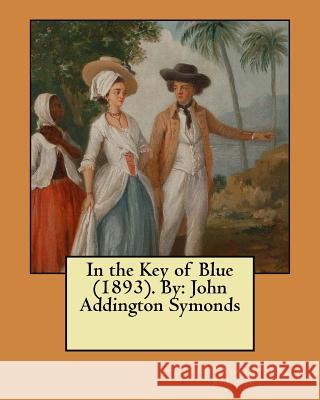In the Key of Blue (1893). By: John Addington Symonds » książka
In the Key of Blue (1893). By: John Addington Symonds
ISBN-13: 9781546557111 / Angielski / Miękka / 2017 / 110 str.
John Addington Symonds 5 October 1840 - 19 April 1893) was an English poet and literary critic. A cultural historian, he was known for his work on the Renaissance, as well as numerous biographies of writers and artists. Although he married and had a family, he was an early advocate of male love (homosexuality), which he believed could include pederastic as well as egalitarian relationships, referring to it as l'amour de l'impossible (love of the impossible).He also wrote much poetry inspired by his homosexual affairs.Symonds was born at Bristol, England in 1840. His father, the senior John Addington Symonds, M.D. (1807-1871), was the author of Criminal Responsibility (1869), The Principles of Beauty (1857) and Sleep and Dreams. Considered delicate, the younger Symonds did not take part in games after age 14 at Harrow School, and he showed no particular promise as a scholar. Symonds's mother died when he was only four years old, and his father had a powerful influence upon the formation of his character. The fashionable Freudian theory that a man's homosexuality is caused by a close-binding-intimate mother and a weak-or-absent father is put to rout by Symonds's childhood, in which the opposite was the case. Admittedly there were mostly women in the household, governesses, aunts, and eventually four sisters, but he records no sense of being overwhelmed by the feminine atmosphere, and was fairly indifferent to their presence. In January 1858 Symonds received a letter from his friend Alfred Pretor (1840-1908), telling of Pretor's affair with their headmaster, Charles John Vaughan. Symonds was shocked and disgusted, feelings complicated by his growing awareness of his own homosexuality. He did not mention the incident for more than a year until, in 1859 and a student at Oxford University, he told the story to John Conington, the Latin professor. Conington approved of romantic relationships between men and boys. He had earlier given Symonds a copy of Ionica, a collection of homoerotic verse by William Johnson Cory, the influential Eton College master and advocate of pederastic pedagogy. Conington encouraged Symonds to tell his father about his friend's affair, and the senior Symonds forced Vaughan to resign from Harrow. Pretor was angered by the younger man's part and never spoke to Symonds again.
Zawartość książki może nie spełniać oczekiwań – reklamacje nie obejmują treści, która mogła nie być redakcyjnie ani merytorycznie opracowana.











